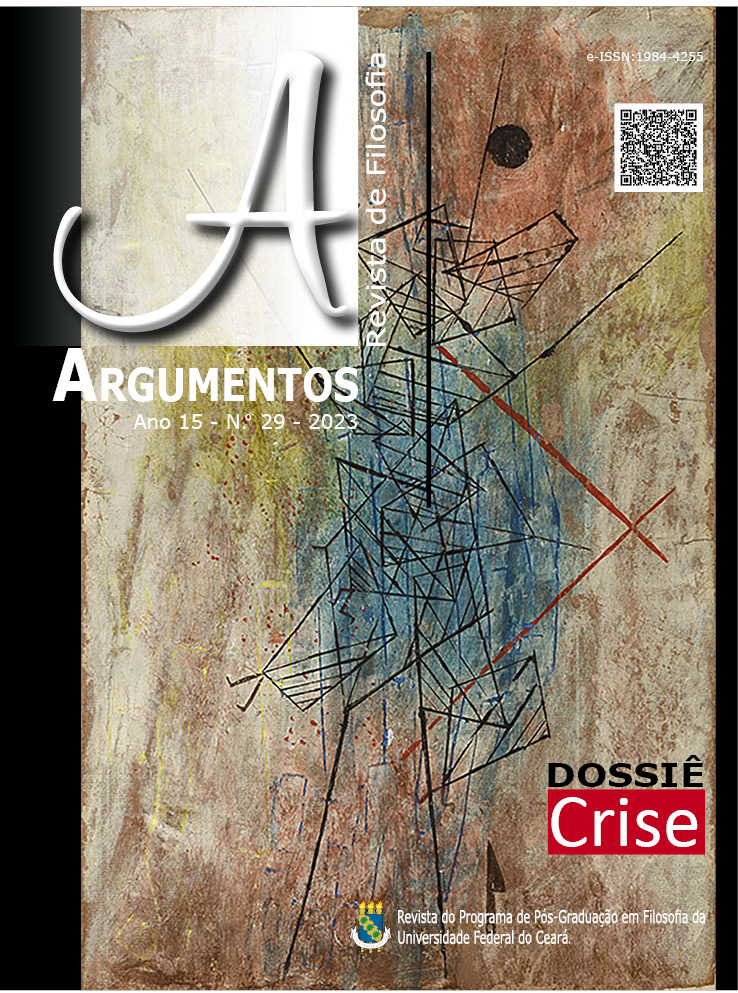Jacques Rancière and the subject of the rights of man
DOI:
https://doi.org/10.36517/Argumentos.29.16Keywords:
Politics. Dissensus. Equality. Rights of Man.Abstract
In this article I discuss the proposal to define the subject of human rights in Jacques Rancière's thought. Initially, I examine Rancière's criticism that Arendt depoliticizes human rights due to her Aristotelian presuppositions. Then I explain how Rancière reconceptualizes the relation between the human and the political to understand the politics of human rights in strategic rather than existential terms. I argue that it provides a more adequate basis for understanding human rights politics than is afforded by Arendt’s conception of the political. In this way, Rancière enables us to see contests over human rights as part and parcel of social struggles that are the core of political life since they entail the enactment of equality within conditions of inequality.
References
ARENDT, H. The Origins of Totalitarianism. Orlando: Harcourt Brace, 1958.
ARENDT, H. On Revolution. Harmondsworth: Penguin, 1990.
ARENDT, H. What Remains? The Language Remains: A Conversation with Günter Gaus. Em: Essays in Understanding: 1930-1954. New York: Shocken Books, 1994.
ARENDT, H. The Human Condition. Chicago: University of Chicago Press, 1998.
BELTRÁN, C. Going Public: Hannah Arendt, Immigrant Action, and the Space of Appearance. Political Theory, v. 37, n. 5, 2009, p. 595-622.
CHAMBERS, S. The Politics of Literarity. Theory and Event, v. 8, n. 3, 2005.
HINCHMANN, L. P.; HINCHMANN, S. K. Heidegger’s Shadow: Hannah Arendt’s Phenomenological Humanism. Review of Politics, v. 46, n. 2, 1984, p. 183-211.
KRAUSE, M. Undocumented Migrants: An Arendtian Perspective. European Journal of Political Theory, v. 7, n. 3, 2008, p. 331-348.
MARX, K. Sobre a questão judaica. Tradução de Nélio Schneider. São Paulo: Boitempo Editorial, 2010.
PITKIN, H. Justice: On Relating Public and Private, Political Theory, v. 9, n. 3, 1981, p. 327-352.
RANCIÈRE, J. Le philosophe et ses pauvres. Paris: Fayard, 1983.
RANCIÈRE, J. O desentendimento. Política e Filosofia. Tradução de Ângela Leite Lopes. São Paulo: Editora 34, 1996.
RANCIÈRE, J. Aux bords du politique. Paris: La fabrique éditions, 1998.
RANCIÈRE, J.; PANAGIA, D. Dissenting Words: A Conversation with Jacques Rancière, Diacritics, v. 30, n. 2, 2000, p. 113-126.
RANCIÈRE, J. Who is the Subject of the Rights of Man? South Atlantic Quarterly v. 103, n. 2/3, 2004, p. 297-310.
RANCIÈRE, J. Democracy, Republic, Representation, Constellations v. 13, n. 3, 2006, p. 297-307.
RANCIÈRE, J. The Thinking of Dissensus: Politics and Aesthetics. Em: BOWMAN, P.; STAMP, R. (Eds.). Reading Rancière. London; New York: Bloomsbury, 2011.
Downloads
Published
Issue
Section
License
Argumentos magazine is licensed under an International Creative Commons Attribution License.
The Magazine uses CC BY inclusion
1) The authors retain the copyright granted to the magazine or the right to initial publication, with the work regularly licensed under the Creative Commons Attribution, which allows the sharing of the work with acknowledgment of authorship and initial publication in this magazine.
2) The authors are authorized to contract additional applicable contracts, for non-exclusive distribution of the version of the work published in this journal (for example, publication in the institutional repository or as a chapter of the book), recognition of authorship and initial publication in this journal.
3) Authors are authorized and encourage to publish and distribute their work online (for example, in institutional repositories or on their personal pages) at any time before or during the editorial process, as they can generate productive changes, as well as increase the impact and reference of published work.




.jpg)










._._3.png)
1.jpg)
._._._.png)
